Communities Worldwide Demand Action on Climate
San Francisco march draws thousands as organizers call for a halt to continued oil and gas extraction in California
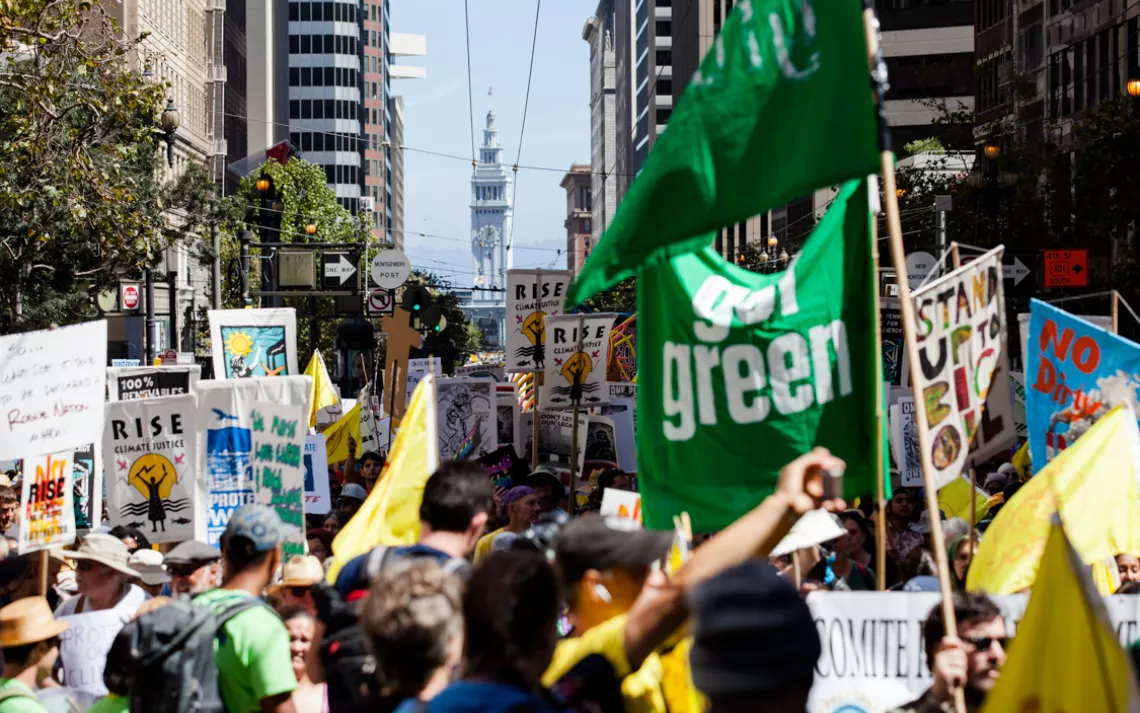
At the San Francisco Rise for Climate, Jobs, and Justice march | Photo by Austin Price
Before Saturday, Laura Finnegan had never participated in an environmental protest. But after she had her first child, Finnegan, whose day job is in the hardware supply industry, began thinking about her daughter’s future. And that’s when the new mom began worrying about climate change.
“Honestly, I really didn’t care that much until I had my daughter. Now, I have to start thinking about what the next 100 years will be like, not just the next 50,” Finnegan said as she juggled two-year-old Charlie in her arms. The 32-year-old was wearing a yellow T-shirt reading “Mothers Out Front for a Livable Climate” and had just gotten off an early morning bus from San Jose to San Francisco. “We don’t know how bad it will be—and it could be really fucking bad. Everything moves so slowly, but the planet doesn’t care. I want to see some more urgency. I want people to see that we have to take climate change seriously.”
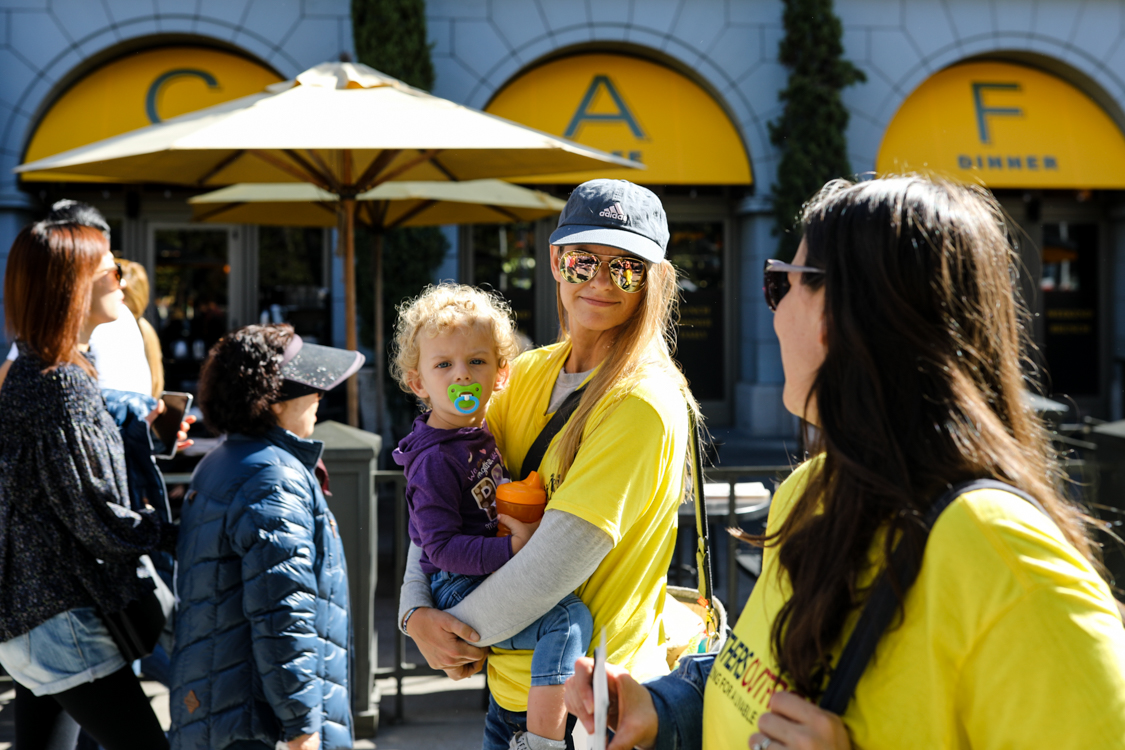
Laura Finnegan | Photo by Austin Price
Finnegan was among the thousands who converged on downtown San Francisco Saturday morning for the Rise for Climate, Jobs, and Justice march—a mass mobilization designed to show community concern about the climate crisis and to put grassroots pressure on the political and business leaders who will gather in the city this coming week for the Global Climate Action Summit. By noon, the march, led by Indigenous activists and people of color, stretched a full 10 blocks through San Francisco’s Financial District. Organizers with 350.org and the Sierra Club estimated that some 30,000 people took part in the rally, which would make it the largest climate protest to have ever taken place on the West Coast.
The San Francisco march was just one of hundreds of similar rallies that occurred Saturday across the United States and around the globe. In Paris, thousands of people rallied in front of the city hall there, while in Kampala, Uganda, some 25,000 people (according to organizers’ estimates) clogged the city streets demanding climate action. Sizeable rallies also took place in Miami and Albuquerque, while in Antarctica, 10 people from a research station there marched across the ice and snow with a “Rise for Climate” sign.
On the streets of San Francisco, the mood was at once buoyant and grimly determined, with the march displaying the kind of pageantry that has become a signature of resistance protests. Before the column began down Market Street, a brass band kept up the energy as a gospel choir led people in singing, “People gonna rise like the water/gonna calm this crisis down. I hear the voice of my great-granddaughter/saying keep it in the ground.” There was the usual kaleidoscope of hand-lettered signs that were by turns earnest, clever, and sardonic: “Make Earth Great Again”; “Reduce, Reuse, Resist”; “Send Ice to the North Pole”; “Extinction Sucks.”
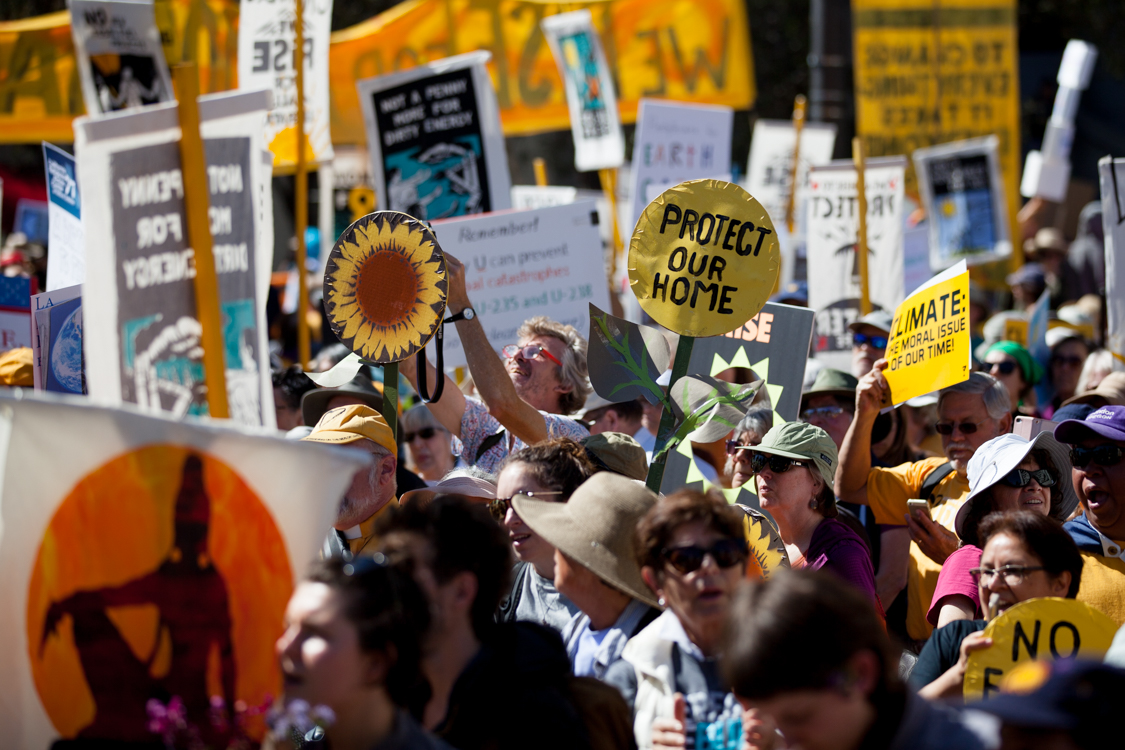
For many marchers, optimism that civilization will eventually address the climate threat in a meaningful way was balanced against a red-hot frustration that the political establishment is not moving quickly enough to stop global greenhouse gas emissions.
“Climate change is obviously real, and we have to change fast because the ice caps are melting,” said Aliyah Knight, 16, a student from Bishop O’Dowd High School in Oakland who came to the march with some 30 classmates. “If we don’t change our ways, Earth is obviously going to fall apart.”
Text FIGHT BACK to 69866
Alex Garcia, a 40-year-old from Oakland who was wearing a traditional Mexica feathered headdress and performing traditional Indigenous dances, also expressed weariness that politicians and businesses have not yet done more to deal with an environmental crisis that he called “self-explanatory.” “If we don’t take care of Mother Earth, a lot of species will go extinct,” Garcia said. “This is an alert for the planet’s health. We have to bring some consciousness. Look at what happened at Standing Rock. The whole world stood by and did nothing, because they thought it was just a Native American thing. Climate change is an everyone thing.”
March organizers had planned Saturday’s mobilization in San Francisco, in part, as a way of putting new pressure on California governor, Jerry Brown, to place a moratorium on new oil and gas leases in the state, which is the United States’ third-largest producer of crude oil, ahead of Alaska. “We are here to demonstrate that real climate leadership is not market strategies like cap and trade that bargain away our clean air,” Miya Yoshitani, executive director of the Asian Pacific Environmental Network, told the crowd before the start of the march. Annie Leonard, head of Greenpeace USA, said, “Real climate leaders don’t approve 20,000 new oil wells.”
(In response to these criticisms, Governor Brown spokesperson Evan Westrup emailed Sierra, “Clearly the world needs to curb its use of oil, and the phase out is already under way in California, where the state is committed to cutting consumption in half. At the same time, oil production in California has dropped by 56 percent.”)
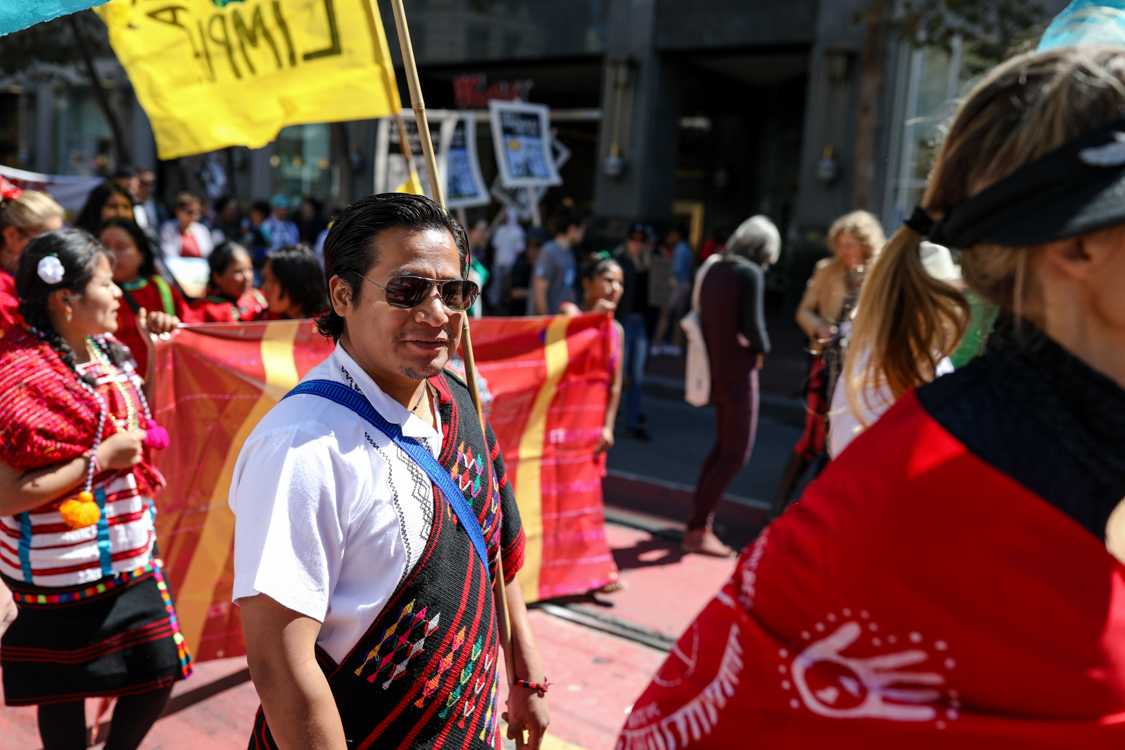
#RiseforClimate marchers | Photo by Austin Price
Some marchers, when asked, expressed grudging appreciation of the governor’s record on climate change. More criticism was aimed at the Trump administration, which since coming to power has launched an all-out assault on environmental and public health protections. There was an overarching sentiment that, regardless of what happens in California, climate change is just one piece of a larger ecological and social crisis. “People all over this country are rising up to build a climate movement rooted in justice,” Sophia Benru of a Minnesota group called Black Visions Collective told the crowd before the march. “Climate change is a symptom. These oil companies have to go, and along with it the capitalist system.”
One of the major challenges facing organizers of this week’s Global Climate Action Summit will be to somehow address such sentiments in earnest. While the political and business leaders concerned about climate change evidently believe it’s possible to decarbonize the economy while leaving much of the status quo intact, many of the grassroots activists marching today hope that action on climate will lead to a broader restructuring of social and economic relations—what Benru called “the liberation of all our communities.”
Bridging these two worldviews—even among people who share a deep concern about climate chaos—will not be easy. But at least one leader of the march expressed cautious optimism that Saturday’s mobilization and the upcoming summit offer an opportunity for greater collaboration between grassroots radicals and powerful insiders.
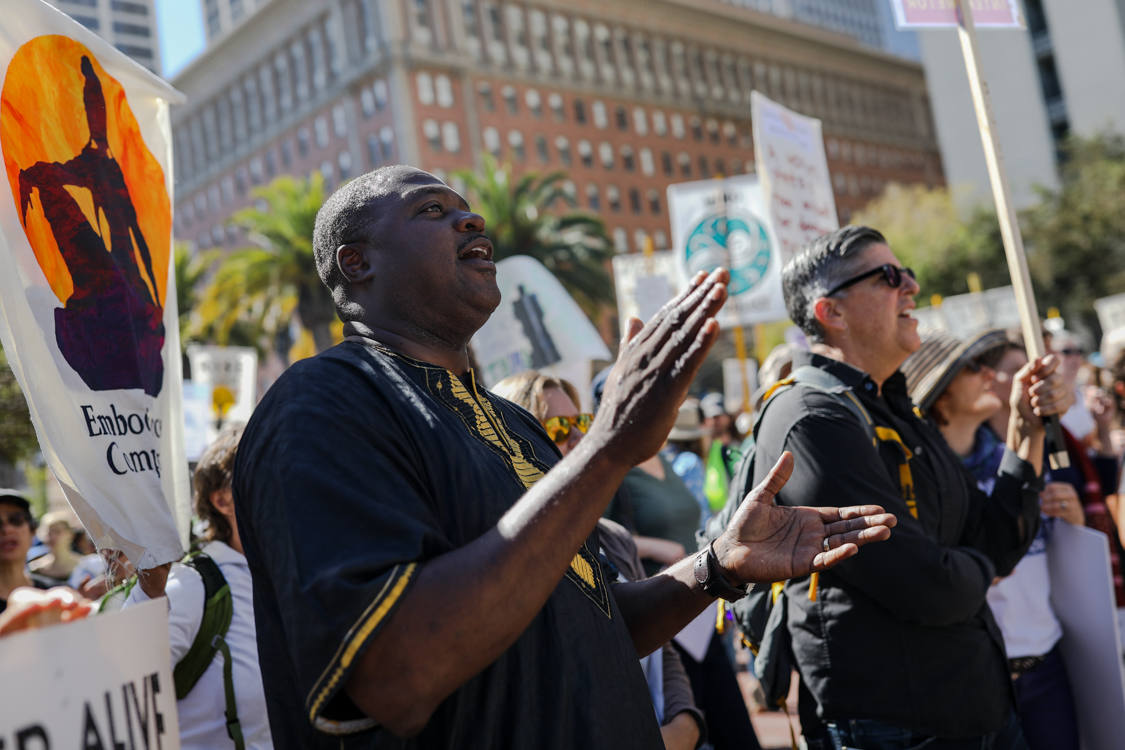
Reverend Ambrose Carroll | Photo by Austin Price
“I’ll be participating in the summit,” said Reverend Ambrose Carroll, pastor of Church by the Side of the Road, an African American church in Berkeley. “A lot of climate change policies still feel like they the are policies that put people in harm—and we need to speak to that. We have some old lies in this country that we need to speak truth to. I think this coming week will be a chance to have some difficult conversations.”
 The Magazine of The Sierra Club
The Magazine of The Sierra Club



